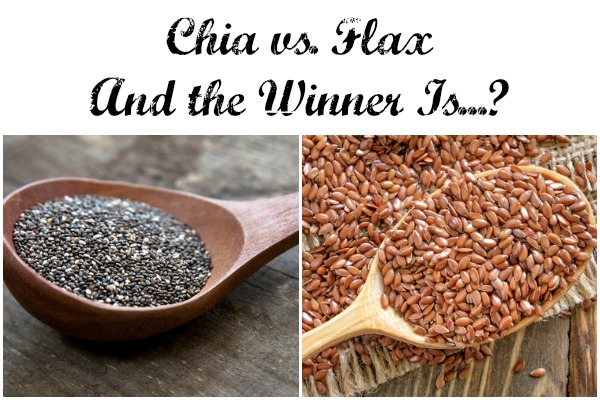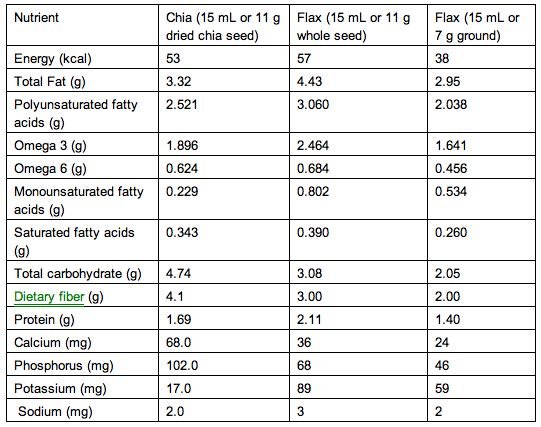
Chia and linseed seeds are rich in protein, omega-3, fiber and magnesium. But if one has to choose, which ones to prioritise?
Perhaps less well-known than flaxseed, chia seeds have been consumed in Central America for over 5000 years and also rich in fiber and omega-3 polyunsaturated fatty acids (alpha-linolenic acid).

Chia seeds: a good source of omega-3 ...
Like flax seeds, chia seeds are an interesting source of omega-3, but only in grounded form: a study shows that overweight women, who are eating two tablespoons of chia seeds (about 25 g) every day for 10 weeks does not cause any change in the level of omega-3 while the same amount of ground chia seeds leads to a significant increase in omega-3 levels. On the other hand, the results do not show any beneficial effect of chia seed consumption on inflammation or risk factors for cardiovascular diseases such as blood pressure, blood glucose, cholesterol or body fat percentage.
... but previously exaggerated benefits
However, a previous study (1) claimed to show a significant reduction in C-reactive protein levels (inflammation marker) after consumption of chia seeds compared to the control group. By analyzing the data more closely, these results were biased and the researchers had exaggerated their results. And because, at the time of the publication of their article, they had declared no conflict of interest (the magazine's policy did not require the disclosure of this information), 5 years later, the Authors found that the study was funded by ChiaNova Research and that the lead author had filed a patent for the use of chia seeds in the treatment of cardiovascular disease. Patent since abandoned, as subsequent studies did not demonstrate significant beneficial effects on cardiovascular risk factors after 12 weeks of consumption of 50g / day of chia seeds (2), results confirmed in a review of the scientific studies conducted On the subject (3).
Several studies have shown, however, that chia seeds may decrease blood pressure (4) but the results obtained are not as good as those obtained with ground flaxseed. Flax seed is about 15 times higher in lignans than chia seeds. More precisely, a lignane called SDG (secoisolariciresinol-diglucoside) is the main representative of this family in flax seeds. It is a phenolic compound, which after ingestion gives rise to enterodiol and enterolactone. These substances are attributed many health benefits due to their antioxidant, detoxifying action and low estrogenic or anti-estrogenic effects. SDG is also known to be an angiotensin-converting enzyme (ACE) inhibitor. Angiotensin inhibitors work by inhibiting the conversion of angiotensin I to angiotensin II, a potent vasoconstrictor, which improves blood flow and blood pressure.
Flaxseed has an anticancer effect
It is precisely the high lignan content of flax seeds that could explain their anti-cancer effect, both in prevention and in survival. A high consumption of lignans would reduce the risk of breast cancer, especially in postmenopausal women. Women whose consumption of lignans is on average 25% higher than the average have a 17% risk of breast cancer compared to those who consume less. The protective effect is limited to hormone-sensitive cancers.
Verdict
According to the results of these studies and because of their higher lignan content, flax seeds have the advantage. Ground seeds can be added to yogurts, in salads, or incorporated into bread or cake preparations. Beware, ground flax seeds are rapidly oxidized and must therefore be stored in the refrigerator. It is best to keep the flaxseed intact and to grind it at the last moment.
Chia seeds can also be easily integrated into the diet: in a soup, a salad or a yoghurt. They can also replace oil or eggs in bakery products: by mixing a serving of chia seeds in 9 portions of water, you will get a chia gel that will substitute for oil and eggs.